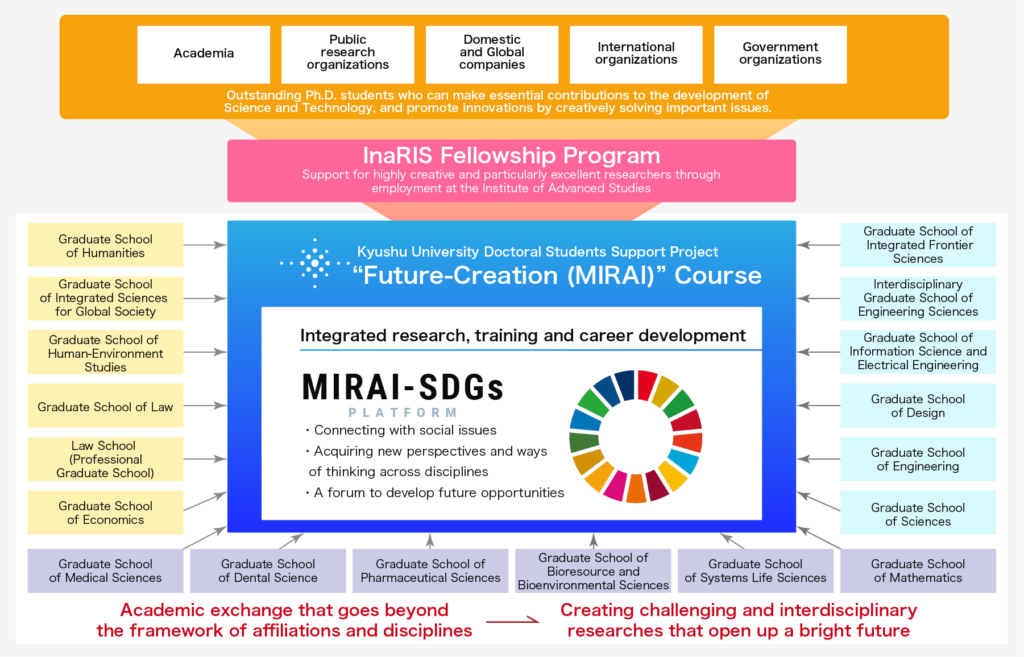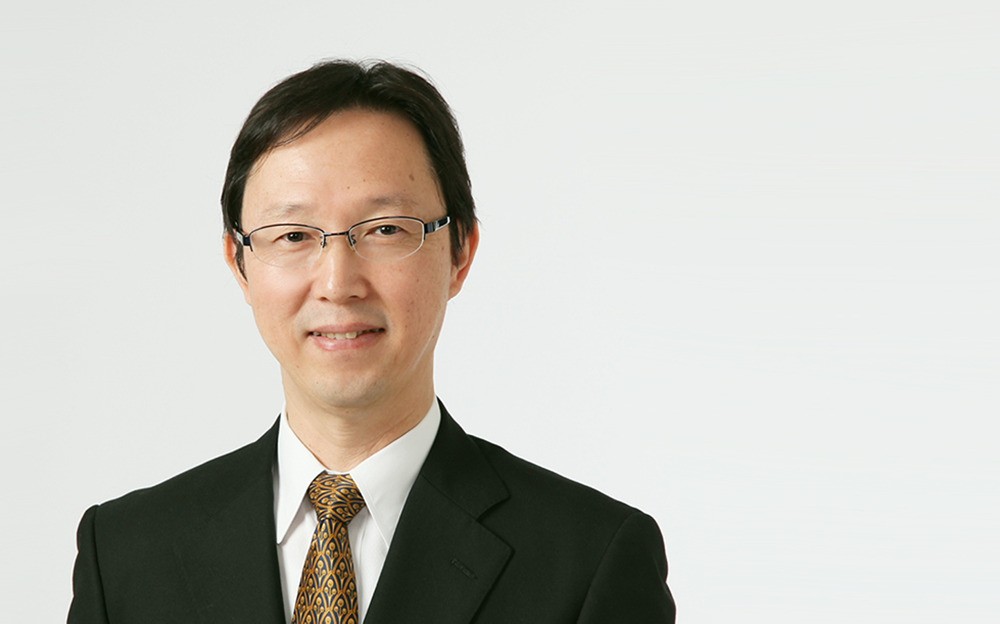Kyushu University “Support for Pioneering Research Initiated by the Next Generation” K-SPRING
Kyushu University’s project to support doctoral students, “Open Platform Fostering System for Ph.D. students who will open up the Future,” has been selected by the JST program “SPRING – Support for Pioneering Research Initiated by the Next Generation”.
The JST SPRING program was born out of a sense of crisis that the number of students enrolling in doctoral courses is decreasing due to financial difficulties and concerns over employment prospects. This program aims to help Ph.D. students become human resources that can actively pursue various career paths, and the following three objectives have been set forth.
(1) Strengthen financial support for excellent aspiring Ph.D. students.
(2) Promote the development of diverse and engaging graduate career paths so that they can play an active role in a wide range of fields.
(3) Promote the strategic reformation of Japan’s doctoral education system based on changes in social needs. So that Ph.D. students can carry out challenging and interdisciplinary research beyond the boundaries of their graduate schools and laboratories.
The selected Ph.D. students can devote themselves to unrestricted, challenging, and interdisciplinary research projects while also being free to change their affiliations and continue receiving support. The program also helps cover students’ research and living expenses and provides career development training. Topics in the latter include interdisciplinary research, transferable skills, internships, and more.
In the K-SPRING project at Kyushu University, the following new doctoral education program will be launched in accordance with the purpose of the JST program.
1. “Future-Creation (MIRAI)” Course : a new All-Kyushu University Ph.D. course and MIRAI-SDGs as an open platform.
All the selected Ph.D. students will enroll in “Future-Creation (MIRAI)” Course. In this Ph.D. course, a bird’s eye view, cross-boundary research ability and comprehensive ability will be enhanced on the basis of the high-level research ability and sufficient basic academic skill of each Ph.D. student.
We believe that all of you in the doctoral program are at the forefront of academic research at this University, aiming to conduct highly original research that no one else is doing. Many students would be working on research to solve existing problems, while others may be working on challenging basic research that will turn 0 into 1. We know that the time and environment in which you can concentrate on your Ph.D. research are precious. But, on the other hand, by acquiring a bird’s eye view of related academic fields and continuously asking yourself the meaning of your research, you will be able to create new directions, goals, and ways of thinking that you should pursue. The society in which you will soon play an active role after obtaining a doctoral degree at Kyushu University is amid international competition, whether you like it or not. Therefore, as a doctoral candidate, you must acquire internationally accepted competencies such as a bird’s-eye view, problem-solving ability, communication skills, and leadership.
In this program, we have established a doctoral course ‒ “Future-Creation (MIRAI)” Course ‒ a multidisciplinary, emergent doctoral course where you will be able to enhance your capability by taking educational programs and pursuing challenging and interdisciplinary research based on your idea. It will become possible to cooperate with other Ph.D. students from different research fields. You will start joining this course by relating your research themes to the issues of the SDGs, selecting one or more SDGs issues you think are most relevant. According to the selection of SDGs issues by students, virtual fusion classes will be formed on the MIRAI-SDGs Open Platform. In this SDGs matrix-based classroom, you will come to know other Ph.D. students in different research fields and faculty members from many disciplines. By learning about their research topics and backgrounds, understanding the essence of each other’s research and prospects, you will be able to acquire a bird’s eye view for a wide range of academic fields. For example, suppose Ph.D. students in the humanities and social sciences meet those in the medical, dental, pharmaceutical or engineering fields on MIRAI-SDGs, and are able to communicate and collaborate organically to solve the SDGs issues. It will provide an opportunity to create “comprehensive knowledge” that contributes to solving issues through the fusion of human, social, and natural science knowledge. In the global society of the future, there will be an increasing need for doctoral personnel with basic knowledge of philosophy, history, economics, etc., who can create new ideas to solve complex problems, with the consideration of the social role and value of science, technology, and human happiness. We envision that the synergistic emergence of new ideas on the MIRAI-SDGs platform, through communications among Ph.D. students, will lead to the development of new interdisciplinary research fields.
2. Various career development and fostering contents provided in “Future-Creation (MIRAI)” Course
In this “Future-Creation (MIRAI)” Course, we will provide various “career development and training contents” to foster the competencies required for you to be active in multiple career paths and stages in the future. For example, you will work on the certification examination called “Research Proposals”, in which you study and find problems in a research field different from your doctoral research project. This program is a doctoral education program that has already been proven over the years in several departments, and Kyushu University is trying to guarantee that you have received training to become “creative” human resources who can work beyond your field of specialization.This training has been administered for many years among several departments. By passing this certification examination, Kyushu University assures society that you are a creative and outstanding doctoral researcher who can work in fields beyond your specialty.
In addition, to the MIRAI-SDGs Platform, we will also invite participants from the industry ‒ such as key members of the company’s research institute and human resources personnel ‒ to present topics and lectures on the doctoral human resources required by the world (society). You will also be able to deliver your work through poster presentations. We think that gaining perspectives from industry, which is the frontline of social issues, will help you have a clearer picture of your future, such as what goals you should have when you see the world as your stage. It is also expected that you can build a variety of career paths through this platform. Our K-SPRING program will provide you with a living allowance and some research expenses for your challenges in this course.
3. Our basic approach to interdisciplinarity and integration
Interdisciplinarity ‒ the ability to combine knowledge from different disciplines to make new integrative research proposals ‒ can only be fostered by thinking deeply in an environment that requires them. We believe that not everyone has it from the beginning. Before entering University, you have studied a wide range of subjects, from the humanities and social sciences to science and engineering. You have the foundation to see things from a bird’s-eye view. Your experience in “Future-Creation (MIRAI)” Course will help you acquire a solid bird’s-eye view, a variety of skills, and friends from different fields that can interact with each other. Our “Future-Creation (MIRAI)” Course will provide you with various educational programs and career development content. You will share the opportunity to build a new network with other Ph.D. students, faculty members, and members of a corporate consortium in different research fields. The “MIRAI-SDGs” will be a place for emergence. These elements will help you break through various unanswered problems in the future. In fact, based on the MIRAI-SDGs initiative, interdisciplinary fusion research has been started by course students from different academic departments. We have high expectations that new academic research from Kyushu University will be nurtured on the platform of the Future Creation Course.
We sincerely hope that the skills and human connections you have developed in this course will help you contribute to the development of science, technology, and innovation in the future of Japan and the world.

